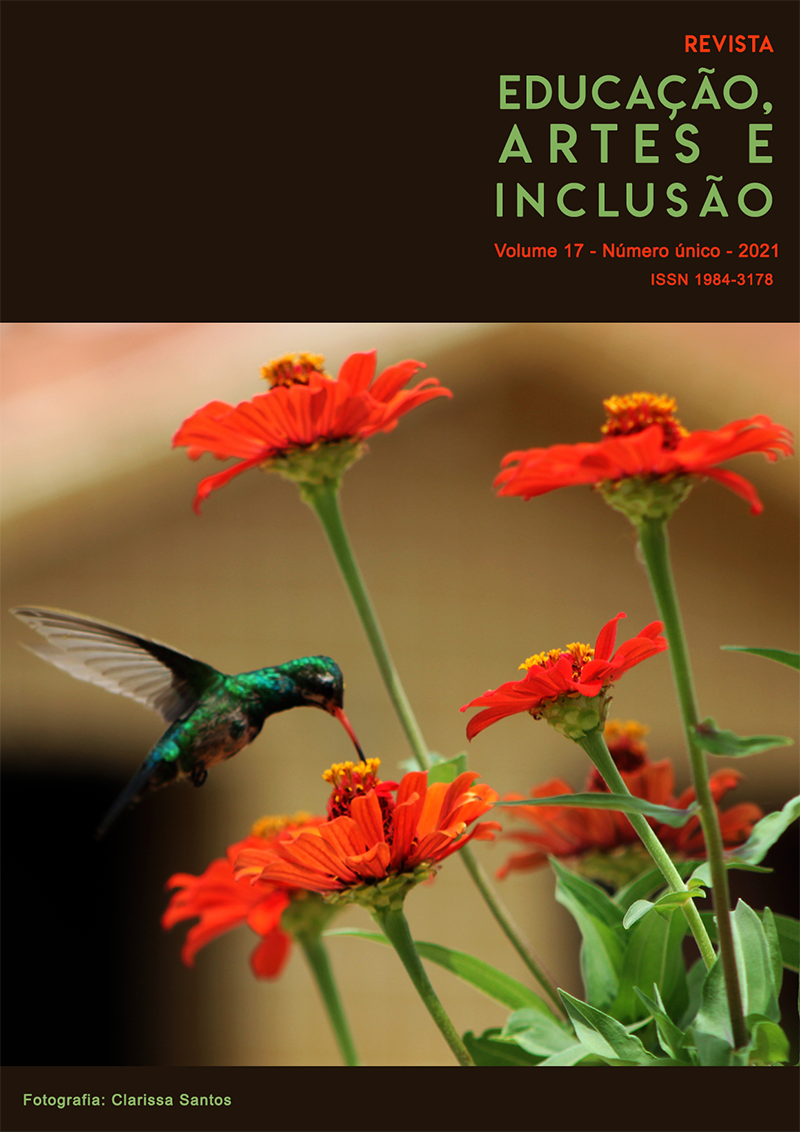Análise da interação dos alunos surdos em Criciúma/SC: perspectiva na pedagogia
DOI:
https://doi.org/10.5965/19843178172021e0017Palavras-chave:
Pedagogia, surdez, escola públicaResumo
Este artigo é resultado de pesquisa do campo de análise da interação dos alunos surdos, realizada nas dependências de duas escolas públicas: a primeira, de Ensino Fundamental, localizada próxima ao centro da cidade de Criciúma - SC, e a outra, de Ensino Médio, localizada no centro de Criciúma - SC. Para a coleta de dados, foram realizadas observações e entrevistas com os alunos surdos, além da aplicação de questionários aos professores ouvintes e intérpretes, tendo em vista avaliar a qualidade da educação para surdos com a perspectiva pedagógica. De modo geral este artigo também apresenta os profissionais que estão envolvidos com a educação dos surdos, como é o caso do professor da classe regular com surdos incluídos, podendo ele representar interpretações variadas, conforme as diferentes culturas e diferenças sociais representadas em aula; além também da presença do intérprete de Libras que representa a ponte de comunicação, mas que a educação não apoiar-se neste profissional para eximir-se do esforço que deve ser coletivo. A metodologia utilizada nesta pesquisa foi a pesquisa de campo com aplicação de questionários aos participantes da pesquisa, além de consultas às referências da área, como Perlin (1998), Skliar (1998), Goldfeld (2002), dentre outras.
Downloads
Referências
GOLDFELD, Márcia. A criança surda: linguagem e cognição numa perspectiva sócio-interacionista. 2. ed. São Paulo: Plexus Editora, 2002.
LODI, Ana Claudia B; LACERDA, Cristina B.F. de (Orgs). Uma escola, duas línguas: letramento em língua portuguesa e língua de sinais nas etapas iniciais de escolarização. Porto Alegre: Mediação, 2010.
PERLIN, Gladis T. T. A surdez: um olhar sobre as diferenças. Porto Alegre: Mediação, 1998.
SACKS, Oliver W. Vendo vozes: uma viagem ao mundo dos surdos. Tradução de Laura Teixeira Motta. São Paulo: Companhia das Letras, 1998.
SILVA, Keli Simões Xavier; OLIVEIRA, Ivone Martins de Oliveira. O Trabalho do Intérprete de Libras na Escola: um estudo de caso. Educação & Realidade, Porto Alegre, v. 41, n. 3, p. 695-712, jul./set. 2016. Disponível em: http://dx.doi.org/10.1590/2175-623661085. Acesso em: 13 dez 2019.
SKLIAR, Carlos. A surdez: um olhar sobre as diferenças. Porto Alegre: Mediação, 1998.
Downloads
Publicado
Como Citar
Edição
Seção
Licença
Copyright (c) 2021 GEISIELEN SANTANA VALSECHI

Este trabalho está licenciado sob uma licença Creative Commons Attribution-NonCommercial 4.0 International License.
A Revista Educação Artes e Inclusão é um periódico que segue a Política de Acesso Livre. Os artigos publicados pela revista são de uso gratuito, destinados a aplicações educacionais e não comerciais. Os artigos cujos autores são identificados representam a expressão do ponto de vista de seus autores e não a posição oficial da Revista Educação, Artes e Inclusão [REAI].
Autores que publicam nesta revista concordam com os seguintes termos:
(a) Autores mantém os direitos autorais e concedem à revista o direito de primeira publicação, com o trabalho simultaneamente licenciado sob a Licença Creative Commons Attribution que permite o compartilhamento do trabalho com reconhecimento da autoria e publicação inicial nesta revista.
(b) Autores têm autorização para assumir contratos adicionais separadamente, para distribuição não-exclusiva da versão do trabalho publicada nesta revista (ex.: publicar em repositório institucional ou como capítulo de livro), com reconhecimento de autoria e publicação inicial nesta revista.
(c) Esta revista proporciona acesso público a todo o seu conteúdo, uma vez que isso permite uma maior visibilidade e alcance dos artigos e resenhas publicados. Para maiores informações sobre esta abordagem, visite Public Knowledge Project.
Esta revista está licenciada com uma Licença Creative Commons Atribuição-NãoComercial 4.0 Internacional. Esta licença permite que outros remixem, adaptem e criem a partir do seu trabalho para fins não comerciais, e embora os novos trabalhos tenham de lhe atribuir o devido crédito e não possam ser usados para fins comerciais, os usuários não têm de licenciar esses trabalhos derivados sob os mesmos termos.





